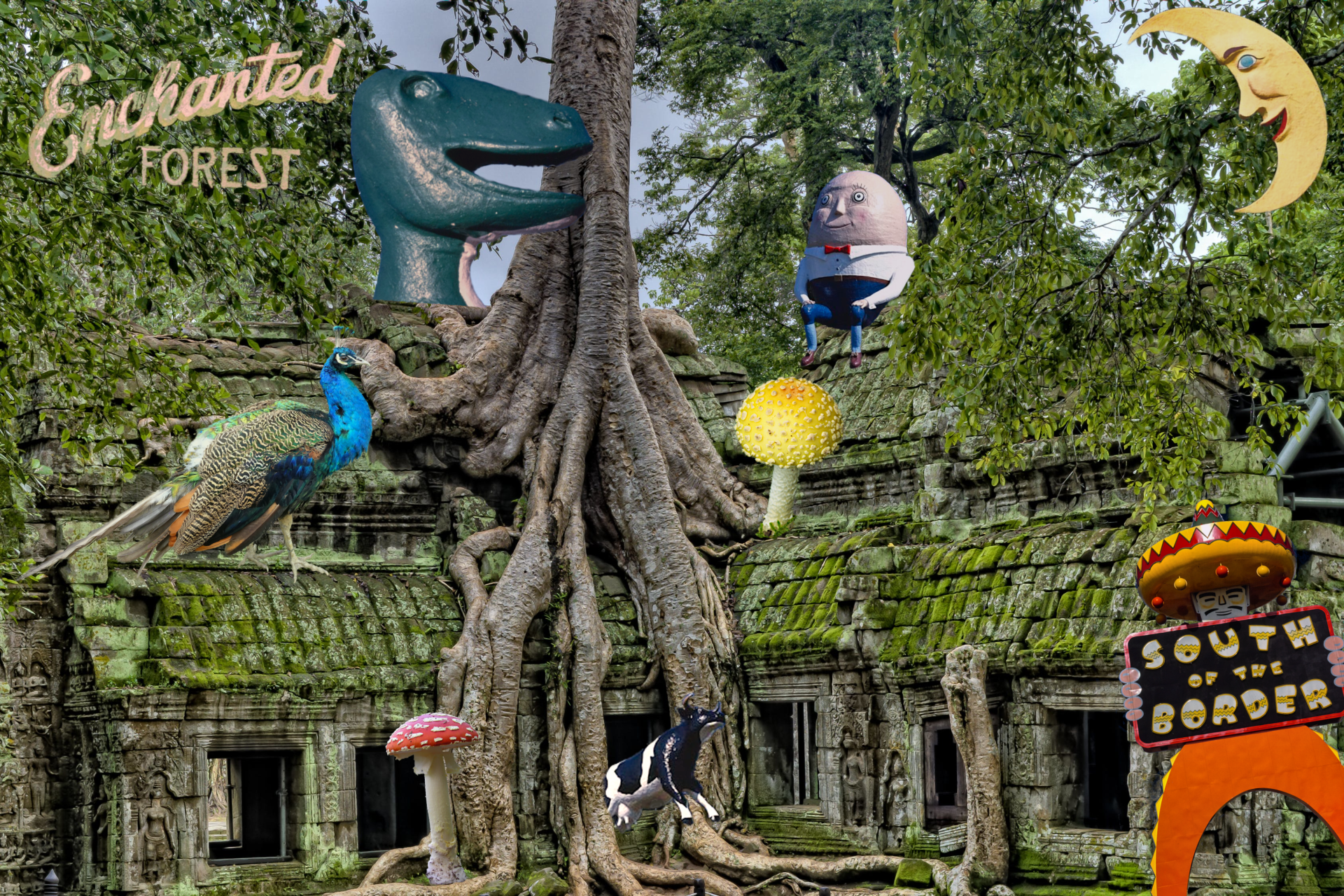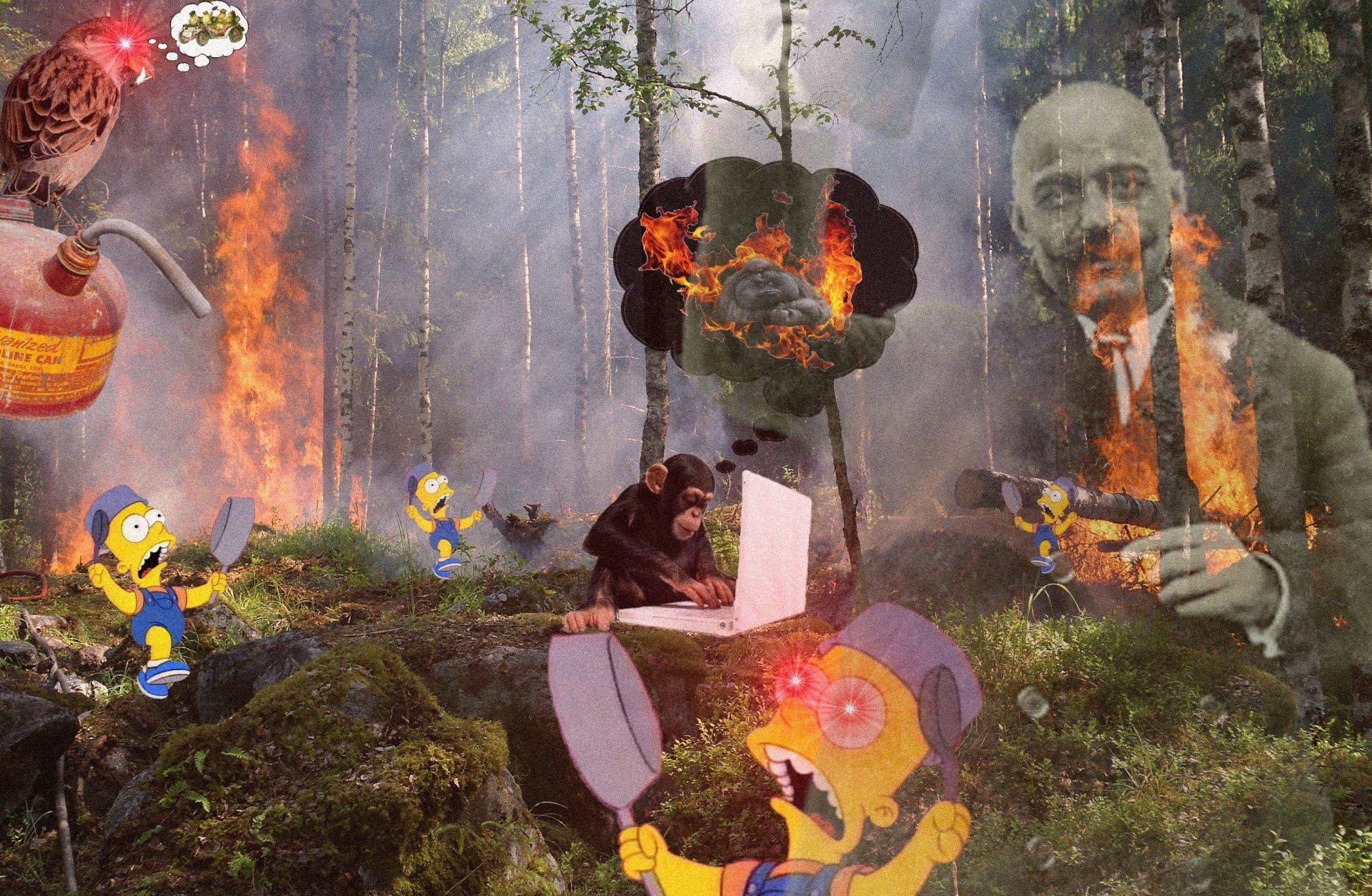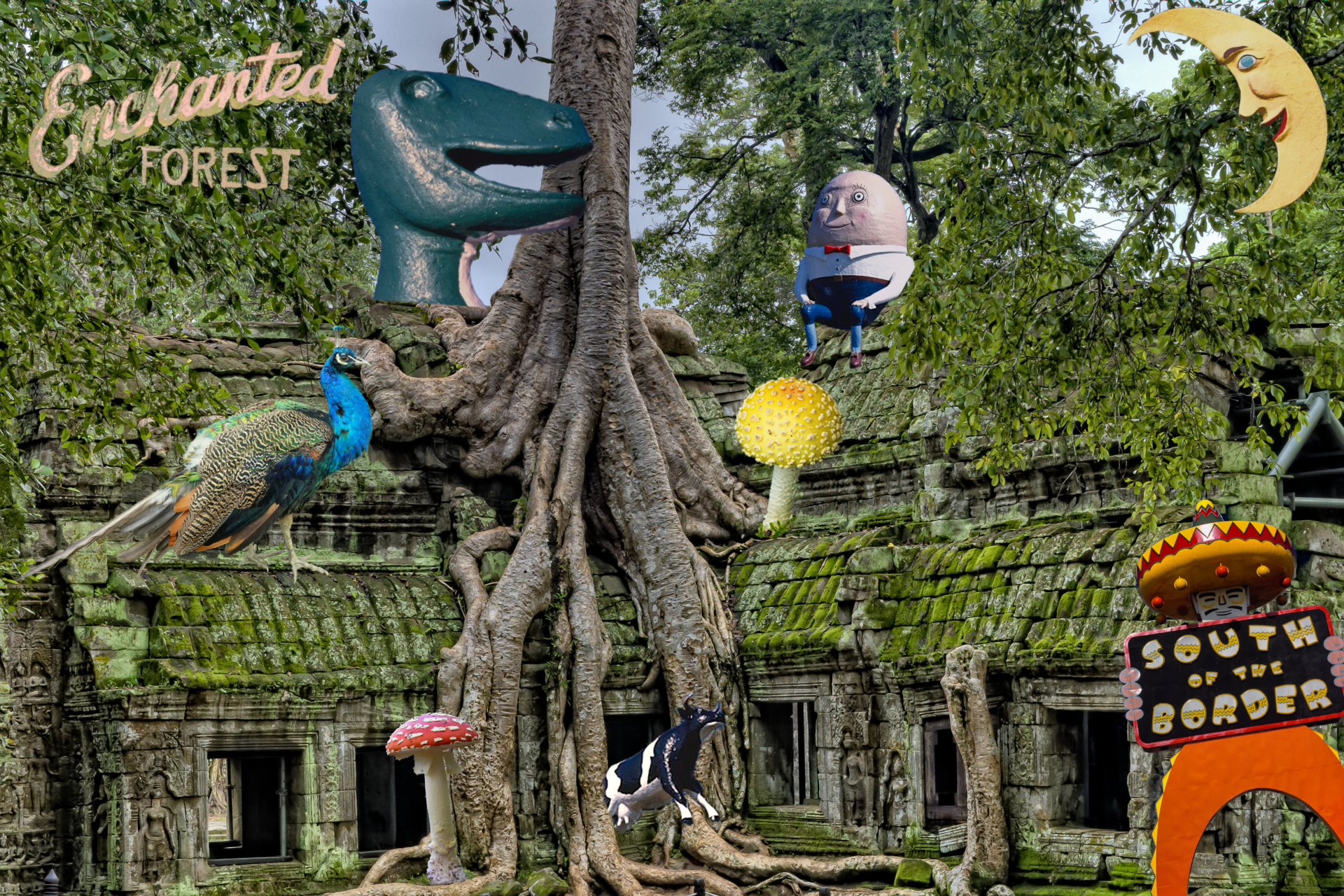
Te autem salvet magister
OK!
Well.
I thought about it a bit, and here's what I decided would be best.
I mean, if you want to establish a fuller context for what follows and if you wish to enrich your aesthetic experience thereof.
First, read this.
Then, read this.
And, while you're at it, bring yourself all the way up to date by reading this, the last thing I wrote before what follows below.
And -- extra credit for the extra-masochistic, -- to give you an intimation of another kind of creative endeavor, which what follows below is a distant echo of -- why not take a gander at this?
It's a lot, I know, but -- I'm just sayin.
When you put all them puzzle-pieces together, you get a real purdy picture.
OK?
Of course, you don't have to.
I also thought it would be best if, all that aside, I provided no further "prefatory remarks," instead just... sneaking up behind you while you gazed out from the deck and giving you a friendly push overboard to see how you swim in those waters.
Don't worry, I'll throw you a rope, too -- a glossary, if you will.
After that more literal glossary, I'll also append a more metaphorical glossary, more extra credit for the extra-masochistic.
3 August 2022

"The Troglodyte's Lament"
A scholar and a solemn ape
that seldom japed Sir Jian was;
beneath a vault of cedars' boughs
to keep his vows he sat because
that of Qigong and of Gurdjieff
bethought he lief that day to write;
his craft and trade of metaphor
as oft before he fain would ply.
While dew yet lay upon the sward
where heavensward his woven shanks
on fulsome thighs in lotus wise
did lightly lie, he spoke then thanks
for hoard of words and turns of phrase
which hidden lay deep in his breast,
like treasury of wealthy king
where golden rings in fastness rest;
from which he deigning now to draw
(as hallowed law bound heathen lord
to faithful vassal gold to yield
who erst afield unsheathéd sword),
within he therefore turned his sight,
where burned the light of wakefulness;
fair world-candle never whelmed
of mental realm in thankful bliss.
Yet through that realm now crept a blight;
bereft of light by stain of shade
was gleaming hoard of fair-wrought words:
there plotted birds an ambuscade! --
or, rather say that hatched they then,
unmatched by men or monkey-kind,
their baleful plot, an infamy
arch-cunningly by fowls designed !
No words of meet solemnity
to melody have since been bound,
no elegiac poësy
nor minstrelsy might shape with sound
a lamentation fitting-fair
of bitter air the heart to pierce,
expressing the barbarity
of sparrows' deeds surpassing fierce.
For Jian, Gurdjieff's learning-knight,
who spurnéd fight of Mammon's get
for fleeting glee of worldly gain,
was now amain sore umbeset
in cloistered grove of his retreat
by bitter tweet and twittering,
by piercing peeps like fletchery,
cruel treachery of passerines;
assaulting him they came a-wing,
a-harrying that saintly ape,
those wretched fowl, fell sparrow-wights,
intrepid shrikes crying "Jackanapes!"
Forbearing this affrontery,
then blunted he and sheathed his tongue,
though waxen wroth by sparrows' jeers
which to his ears bore reek of dung;
and mindful of his master's lore,
the rather swore that simian
his oath anew to swink and dree
full-wittingly cotidian,
which ever and unceasing done
increasing one's internal might,
in lowly ape of his estate
would incarnate supernal light.
Alas! to long so loftily
will often be aspirant's bane,
a costly doctrine troglodytes
and men alike must buy with pain;
for as soon as had that anthropoid
so sore-annoyed by jabbering
affirmed his vow, there waddled forth
a goblin horde a-slavering.
Accurséd brood's foul progeny
no doubt were these demonic oafs,
whose keening shrieks and gibbering
to naught did bring Sir Jian's oath;
for having surfeit of this feast
of little beasts' lewd clamoring,
with mighty yelp he frighted them,
requiting then their yammering:
"Ye shitty little nadder-folk,
no antidote hath earthly leech
for venomous palaver of
your jabber-jibber garbage-speech!"
But sparrow-wights and goblin-oafs
such haughty boasts do set at naught;
with zeal renewed they louder dinned
indulging in no second thought,
while Jian being overthrown
then hove a groan and lay a-swoon,
his inwit mordant chiding him,
requiting sin with baleful wound,
another costly doctrine apes
must often pay a toll to learn:
to knowing sinner over-bold
swift seven-fold woes do return;
which lore our wretched troglodyte
Sir Jian hight Gurdjieff had taught,
whose name to speak the jaw doth jar,
the heptaparaparshinokh.
His master then remembering,
endeavoring from swoon to rise,
Sir Jian heedless of the din
repenting sin then drew his eyes
so doleful up through cedars' boughs
where ere he vowed so recklessly,
perchance from God enthroned on high
to token find of clemency;
astonied was that woeful ape
reproachful face extolled to find --
the ghostly image of Gurdjieff,
a shadow-wreath mid boles entwined,
which silently did him salute
tinged with rebuke and sadly stared,
conveying a thought without a sound:
"te autem salvet magister!"
jape -- act foolishly; joke
vault -- arched roof or ceiling
lief -- gladly
fain -- gladly
sward -- grass-covered ground
shank -- lower leg (from knee to ankle)
wise -- manner
fastness -- stronghold; security
deign -- consider worthy
erst -- formerly; long ago
afield -- in the (battle)-field; far away
whelm -- cover; bury; ruin; destroy
ambuscade -- ambush
baleful -- dire; wicked; cruel; ruinous; destructive
meet -- appropriate; suitable
poesy -- poetry
elegiac -- expressing sorrow; lamenting; of or like an elegy (a poetic meter used for songs or poems of mourning)
fitting -- fittingly; suitably
bitter -- cutting; sharp; cruel; biting
air -- melody; tune
surpassing -- exceedingly
learning-knight -- disciple
Mammon -- riches and worldliness (negatively) personified
get -- offspring (i.e., that which is begotten)
amain -- with violence, strength, or force
sore -- sorely, painfully; greatly
umbeset -- surrounded in hostility
fletchery -- arrows; literally, the work of fletchers (arrow-makers)
passerine -- sparrow-like; by extension, any sparrow
a-wing -- flying (i.e., on wings)
fell -- cruel; vicious; fierce
wight -- living creature; being
shrike -- any bird with a shrill call
Jackanapes -- monkey; conceited fellow; absurd fop
affrontery -- impudence, shamelessness; boldness in transgression
waxen -- past participle form of "wax," to grow or to become
wroth -- wrathful
reek -- fumes; smoke; vapor
lore -- teaching; learning; knowledge; doctrine
the rather -- all the more quickly
swink -- to toil
dree -- endure; suffer
full- -- completely, totally
cotidian -- daily
estate -- status; position
supernal -- heavenly; divine
bane -- slayer; killer
troglodyte -- cave-dweller, but here meaning "chimp," as a chimpanzee's species-name is pan troglodytes
anthropoid -- literally, "man-like"; human or simian, of monkeys or humans; by extension, any particular monkey or human
slavering -- dribbling spit from the mouth
oaf -- (related to "elf"); changeling; foolish or defective child left by fairies in place of another carried off
gibbering -- speaking rapidly and inarticulately
surfeit -- excess
lewd -- unlearned; unlettered; coarse; vile
yelp -- boast; piercing cry
quite/requite -- pay back; recompense
yammer -- to make loud, annoying noise
nadder -- older form of "adder," any venomous snake
leech -- healer; physician
palaver -- long, tedious, idle talk
din -- loud, resounding noise; to make such a noise
hove -- simple past tense of "heave," to utter or raise up with effort
a-swoon -- in a faint; in a state of unconsciousness
inwit -- conscience
mordant -- biting
chide -- scold; nag
hight -- named
heptaparaparshinokh -- "(cosmic) law of sevenfoldness," a term coined by Gurdjieff
doleful -- full of grief or sorrow
ere -- before
token -- sign
astonied -- astonished
extolled -- raised up
mid -- amid
bole -- tree-trunk
te autem salvet magister -- "(your) master greets you/wishes you well, too "; imperative form ("Be well!") of Latin "salveo," to be well

Credit is due to the Online Etymology Dictionary for some of the glosses provided above, which I used in place of my own words, since it was less work that way.
By the way, if you're not up on the gentleman's science of etymology, that site is a great place to begin.
Again by the way, if you're not up on etymology, you're not really gonna master your English, or any other language you wanna master.
Part of mastery is knowing the roots, up and down, in and out.
In English, that means learning the core Germanic, Latin, and Greek vocabulary and its building-blocks.
I got my real start with a 1980 edition of Webster's New Collegiate Dictionary, which even now is full of tiny slips of paper bookmarking curious words and etymologies. That dictionary I read, in time, almost in full, like a novel, driven by an unslakeable thirst for learning.
I'd even go so far as to say that that dictionary is in many ways preferable to the unabridged Oxford English Dictionary (which is good for lots of reasons, and which I've also got).
Anyway.
Onward.
Not bad, huh?
Let me give you the story.
Last week, I wrote Salve, Magister.
It'd been a month since I'd written, and I was itchin to get back in the saddle. This was after spending a lot of time both reflecting and introspecting (not always enjoyable), and doing other grown-up stuff (seldom enjoyable).
So, when at last I sat to write again, it was like, "Ah -- now I have the space to really indulge my creativity."
And, I kind of thought it would be like it was in April when, re-established after long wandering by my "well at the inexhaustible source," I drew forth inspired speech at will, ladle after ladleful.
That felt like it would never end, until it did.
One day, after about a month of that, a clear message came to me: "Stop writing now." So, I did -- there was so much other stuff I had to do by then.
Anyway, the thing is, Salve, Magister was a return to the well much as I'd envisioned it: the idea for the essay came to me, inspired speech flowed freely forth, and -- bingo, bango, bongo, I wrote in just an hour or two what you can read there now.
Very gratifying, I have to say. Many pats of my own back followed.
So I figured, I'll do the same thing tomorrow!
Months before, I'd had the idea to write about the Spring Forest Qigong concept and practice of "working with the masters."
That's what I decided I'd write about tomorrow.
Why?
Well, to pad the Qigong Writing section of this website, of course -- it's lookin a little lean at the moment. But also because it's such a crucial part of this Qigong I've learned and practice.
Calling on (and merging with) the energy of your Master when practicing Qigong movements, doing Qigong meditation, or doing Qigong healing is a fundamental part of Spring Forest Qigong, and while, in the past, Master Lin never really talked much about it or made it seem like a big deal (as far as I could tell)... it's actually a very advanced technique and is one of many reasons, also easy to overlook, why Spring Forest Qigong can facilitate such powerful healing and rapid "advancement," in terms of "going deeper into the practice."
I found this out by surprise, as I'm sure many students have, although a few years ago Master Lin did begin talking about the subject more explicitly.
In fact, he gave a series of talks about it ("Working with the Masters") and wrote a book of the same name, still unpublished, on the same subject.
I read a final draft of the book, by the way, and it blew my mind. Whenever the book comes out -- get yourself a copy.
Anyway.
My idea was that, in my own particular, peculiar way, I should write something here in a deeper way about "working with a Master" in Qigong practice, weaving into the discussion what I'd come to understand along those lines from Gurdjieff's teaching, as well as whatever other tidbits of various provenance might be drawn to it by the gravitational pull of my always-weighty mentation.
You know, like this:

Shouts out to Bill Griffith for many years of such copyrighted comic art.
But do you think it played out that way?
Hell 2 tha Naw, Naw, 2 tha Naw, Naw, Naw.
Hell to the naw.
I mean, I sat there (here, actually) for hours on end: writing a line, stopping, blinking; then I'd delete it, get up, pee, sit down again; write an impoverished, wobbly-legged little paragraph, blink at it, drool; then erasing what I wrote, would get up angry, stare out the window; sit down, get up, pee again, curse a little; rinse, lather, repeat, again and again.
I just couldn't make it happen.
That's only half the story. The other half had already been irritating me, constantly and ever more, for about two months.
Maybe 50 feet from where I write is a playground.
Exhibit A, y'Honor.
Meanwhile, over the last six months, the lady living below me has, piecemeal and by trial and error, been building a sprawling cafeteria-playground for the local birds, squirrels, and occasional bold rats.
I have to say, we've got a beautifully landscaped neighborhood with lots of trees, mostly evergreen -- so, it's already a yearlong suburban haven for small wildlife.
Anyway, back to the cafeteria-playground.
I'm talking hanging bird-feeders... several metal stands, each holding several plates heaped with birdseed... and a whole array of serving-plates spread out on the ground, also full of every kind of nut and seed, besides water, fruit, and whatever else tickles her fancy.
Exhibit B, y'Honor.
Do you think the animals like having a free feast every day?
Anyway, so, as I'm blinking and staring and drooling, slowly working myself up to a boil over not being able to write about Gurdjieff, Qigong, and working with the Masters (all the while sweating constantly because I refuse to turn on the AC, even when it's 100 out)... now, just like every other day this summer between, like, 11 am and midnight, a bunch of neighborhood kids start shrieking at the playground and a bunch of neighborhood sparrows start chattering.
You might think I'm exaggerating, but I'm not.
I mean, the sparrows stop at sundown, but a lot of times the children do not.
A few of those children really, really like to shriek, others start to echo them, and then shrieking-contests ensue, sometimes till midnight, until at last some baggy-eyed adult has a meltdown and screams at them from their balcony to shut the f--- up (not me, I swear).
Meanwhile, the smorgasbord of seed laid out in offering below, rather than drawing all the sundry songbirds of heaven to soothe my seething mind with their mingled minstrelsy... only ever seems to draw the goon-squad, a whole raggedy flock of thuggish little sparrows.
Do you think they have anything interesting to say?
Hell to the naw.
Near as I can tell, all they ever say, between (and sometimes amid) frequent interludes of defecation and wallowing in the dirt, is: "HEY! HEY! HEY! HEY! HEY!"
Charming.
So, all that is to say, I didn't write
jack that day, and -- believe it or not -- actually spent the rest of the day (and night) in a Cosmic-Tier Mopey Doo-Doo Funk; which, being interpreted visually for your more complete understanding, felt something like this:

Now.
If you read Salve, Magister, you will know that, amid all this, I had continued to read, as I'd done for the preceding couple of months in a Gurdjieffian super-effort, whatever works of J.R.R. Tolkien that I had here with me.
I alluded elsewhere, more than once, to his having been a "big, big influence" on me.
Let me broaden the narrow vista afforded by that rhetorical understatement by saying that, for four or five years at least, most of what I read (and re-read) was Tolkien. And not just The Lord of the Rings or The Hobbit or The Silmarillion. No; I mean, everything I could get my grubby little mitts on.
Like, Unfinished Tales; all twelve volumes of The History of Middle-earth; The Letters of J.R.R. Tolkien; The Monsters and the Critics; Poems and Stories; The Children of Húrin; and Thomas Shippey's J.R.R. Tolkien: Author of the Century and Road to Middle-Earth.
Speaking of "working with the masters," that's apropos.
To work with a Master, in the Qigong context as Spring Forest Qigong understands it, is not just to "like" that Master, to have faith or to "believe" in him, to memorize his teachings or to repeat them, in word or deed, mechanically without understanding.
No.
Listen to Thoreau:
"There are nowadays professors of philosophy, but not philosophers. Yet it is admirable to profess because it was once admirable to live. To be a philosopher is not merely to have subtle thoughts, nor even to found a school, but so to love wisdom as to live according to its dictates, a life of simplicity, independence, magnanimity, and trust."
Mm.
Or, it's like the Good Governor told this humble hobo one night in the dining-car of his Glory Train.
He was talking about playing jazz piano, which he did with real fire and real spirit, I have to say.
What he said was that, leaving aside all the other winding courses and colorful side-tracks of his storied life, what he'd always really liked and wanted to do was to play jazz piano.
And what he said about that was that the really good musicians aren't playing from musical scores or even from their "mind," but rather are connecting, through their most intense feeling and longing, directly to God, to a higher spiritual intelligence, which intelligence and spirit in turn plays through them.
They themselves become an instrument, as the saying goes.
Naturally, the Good Governor said, this kind of playing can't be "taught" or "imitated."
Even if you were to transcribe exactly what an inspired musician of that caliber had played in a particularly spirited performance, if you then played it exactly as transcribed... it still wouldn't have the same fire and spirit and inspiration.
Except...
Except, what you could do, and what he had done, was to take such a spirited recording of an inspired musician you really love, and just listen to it over and over and over again.
Again and again and again, listening not just with your ears, but with your whole being.
Then... try to play what they played, exactly like they played it.
And keep doing that, trying to mimic in your own playing, with love and sincerity, not just the notes of the music, but even every little shade of "intonation" that you hear in the master-musician's playing.
What he said was, if you do that long enough, sincerely enough, with everything you have... you can, in fact, by some mysterious grace you can't predict, tap into the very same fire and spirit, the very same higher spiritual intelligence that played through the master-musician in that recording you listened to so lovingly.
Yes.
And, at that point, if and when you can learn to ride the waves of the inspired feeling that starts pouring out and into you, your own playing will not only have that same fire and spirit, but that inspiring intelligence will take you far, far beyond the narrow bounds of the recording you started with and which served as an invocation.
What I'm telling you is that "working with the masters," as Spring Forest Qigong means it, is a lot like that.
What I'm also telling you is that, unwittingly, 20 years ago, I was already applying that "methodology of spiritual science" to writing, to verbal self-expression, by immersing myself so deeply and so sincerely into J.R.R. Tolkien's own verbal self-expression.
When at last I emerged again, having been immersed therein to my satisfaction and soaked to the marrow, not only did I feel that I understood Tolkien's mind and heart inside and out... not only had I so thoroughly digested and absorbed the flavor of his "cooking" that I could, at least in small ways, imitate it well... not only was that flavor now a key ingredient in my own unique cooking... but, just as in the case of sincere and heartfelt imitation of the jazz-masters, so with this devotional literary imitation I'd found a way to independently "access the spirit."
In short, I had learned, in a little way, how to use form to go beyond form.
All that is to say that, after emerging from my brief Cosmic Doo-Doo Funk, having already re-immersed myself after many years in Tolkien's work, I had the thought: "Hey, rather than writing about 'working with the masters,' why don't I write about my failure to write about working with the masters? And why don't I cast it into epic verse?"
Tolkien was big on poetry, and I think he was actually pretty good at it.
He devised a unique meter, certainly not an easy one to compose in, which he used most memorably in "The Song of Eärendil" (check this and this out) and in "Errantry" (here you go).
Listen.
I don't know why I thought that would be less work than doubling down and forcing myself to write the essay I'd originally intended (it wasn't); but I rightly felt -- dead-center intuitive hit -- that simply side-stepping the creative block, rather than hammering it to dust, was the way to really keep things flowing.
It was a long and winding course, but it really moved, and where it took me -- I mean, here we are.
Writing that was fun, of course, if also frustrating.
After a while, I even started thinking in that rhyme and meter, like about what I had to get at the store or do that day.
But the endeavor let me do a few things I like.
Like what?
First, to express very "low" or childish or silly things in an exalted way.
Second, to do something that forces me to dig deep to draw on as-yet untapped inner resources.
And third, to wild out with archaisms, anachronisms, and otherwise obsolescent language.
I think I did a pretty good job.
* pat, pat *
I tried to keep the English period-specific (drawing on language roughly contemporary with Chaucer, say 1200-1500 AD) -- except when I didn't want to, especially for laughs.
At that same time, I was trying to emulate not just the meter and rhyming, but the overall flavor (of theme, diction, and feeling) of Tolkien's two poems -- except, of course, when pushing the boundaries with parody.
Anyway, the last thing I'll say -- the reason I don't usually explain myself is, as you can see, it generates a lot of gas -- is that, now that I've done the writing and can look at the finished product, I see that, rather than writing, as originally envisioned, some sterile essay birthed solely from my mind like Athena from Zeus's brow, I had to go through what I wanted to write about to be able to write about it.
Knowutuhmean?
Do you know how Gurdjieff wrote his long, long Beelzebub's Tales to His Grandson, a notoriously (and deliberately) difficult, many-layered masterwork?
Leaving his many students and disciples at his "Institute for the Harmonious Development of Man," which was in a rural French chateau, he'd drive to Paris, stay there alone for a few days, and sit down in the noisiest, smokiest, booziest, flooziest cafe he could find to do the writing -- for hours at a time!
Did you know that one thing he'd do was create for his students situations of physical labor, emotional strain, or mental exertion so intense that it both forced them to tap into and to draw on vast, deep, as-yet-virgin inner resources and to learn to establish their attention fixedly, not on their momentary pain, but on their ever-present, ever-untouched witnessing consciousness?
Well -- apparently, he liked to put himself through that, too.
He called this "conscious labor" and "voluntary suffering," and it was a central practical feature of his teaching.
Like I said above:
To work with a Master, in the Qigong context as Spring Forest Qigong understands it, is not just to "like" that Master, to have faith or to "believe" in him, to memorize his teachings or to repeat them, in word or deed, mechanically without understanding.
No; working with a Master means thinking like him, speaking like him, walking like him, conducting yourself in all things at all times like him.
In Qigong terms, by so doing you are harmonizing and merging yourself energetically with your master on every level.
Establishing sympathetic resonance, in musical terms.
When you do that, not only will your Master's guidance and wisdom and understanding begin to arise in you spontaneously and unbidden, but through that merging and harmonizing, you will be better able to access the Divine directly, yourself; since, at least to start, your Master has a more stable connection to Divine Intelligence than you, if through your loving devotion you can come to merge energetically, on more and more levels, with him, then his connection to the Divine, in effect, becomes yours.
And, you know what else?
Believe it or not, on some level, I think Tolkien knew all that, too, which is why, even now, on some level, I still consider him to be one of my Masters.
I'll leave you with an excerpt from a letter he wrote to his son Christopher, who at that time (1944) was stationed in South Africa. This was during World War II. Christopher didn't like it, not least because of the sometimes-disgusting comportment of the people around him.
It's not so well spelled out, but, having read the preceding (congratulations to you if you did), you should have the eyes to see what I'm sharing, and what Tolkien is saying.
Salvete, magistri!
"Well, there you are: a hobbit amongst the Urukhai. Keep up your hobbitry in heart, and think that all stories feel like that when you are in them. You are inside a very great story! I think also that you are suffering from suppressed 'writing'. That may be my fault. You have had rather too much of me and my peculiar mode of thought and reaction. And as we are so akin it has proved rather powerful. Possibly inhibited you. I think if you could begin to write, and find your own mode, or even (for a start) imitate mine, you would find it a great relief. I sense amongst all your pains (some merely physical) the desire to express your feeling about good, evil, fair, foul in some way: to rationalize it, and prevent it just festering. In my case it generated Morgoth and the History of the Gnomes. Lots of the early parts of which (and the languages) – discarded or absorbed – were done in grimy canteens, at lectures in cold fogs, in huts full of blasphemy and smut, or by candle light in bell-tents, even some down in dugouts under shell fire."
Letters of J.R.R. Tolkien





